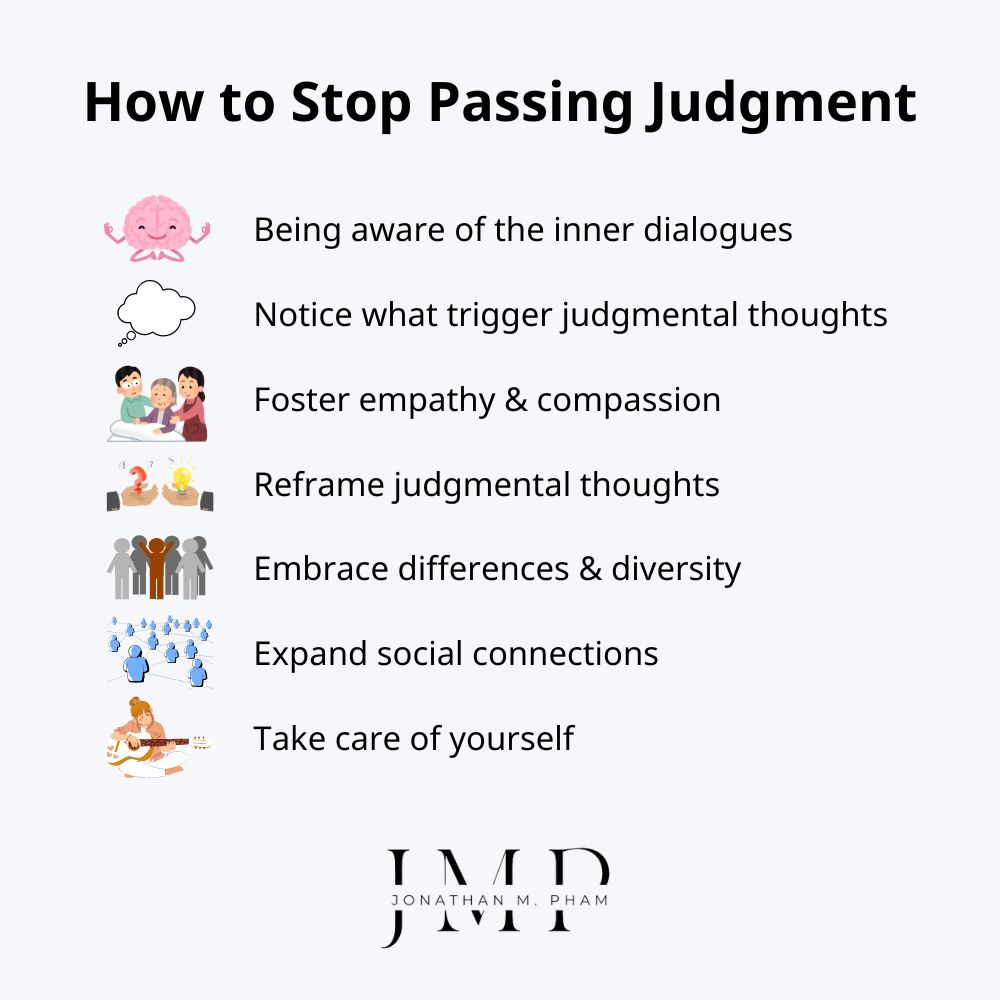The bad habit of passing judgment is a paramount hurdle to behavior change; and yet, abandoning it is an indispensable prerequisite for one to reach greater heights and attain fulfillment in life.
Passing judgment is something inherent within human nature; far too often, we find ourselves prematurely labeling and categorizing others as we interact with them. The weight of judgment, like an anchor, restricts our ability to evolve, learn, and embrace the complexities of life. As such, we must learn to recognize the detrimental impact of such a practice – and embark on a journey toward a more compassionate and open-minded existence.
Highlights
- Passing judgment often involves forming hasty, critical opinions about others based on limited information. Typically driven by subconscious biases and emotional responses, it is a major cause of harmful stereotypes and interpersonal conflicts.
- Our innate tendency to judge others stems from the desire to quickly understand people‘s motivations and assess situations. If not consciously controlled, the behavior may give rise to misunderstandings and various other interpersonal issues (e.g. negativity, isolation, stifled self-growth, etc).
- Rather than hastily attributing others’ behavior to their personality, we should consider situational factors to foster understanding and avoid harmful assumptions, especially for unfamiliar individuals or those with whom we frequently clash.
- To stop passing judgment, one needs to invest in cultivating self-awareness, empathy, and compassion, while also expanding social connections and taking care of oneself.
- Shifting from judgmental reactions to thoughtful evaluation replaces emotional responses with rational assessment, thereby fostering understanding, inclusivity, and better decision-making. By practicing neutral listening, you contribute to reducing unnecessary conflicts – and will gradually become perceived by others as an approachable person.
What Does Passing Judgment Mean?
To pass judgment on someone or something is to form and express an opinion about them, especially a critical one. It involves evaluating their actions, character, or worthiness based on one’s own standards or beliefs.
Key characteristics:
- Typically implying a negative assessment/ criticism.
- Are sometimes made based on limited information – without a complete understanding of the situation.
- Often hurting others’ feelings.
- etc.
From the very moment we encounter someone, an innate response is triggered within us; we are prompted to instinctively process information about that individual and formulate an opinion (whether positive or negative) about them.
- Are they a potential ally or adversary?
- Can I trust this person, or is their friendly outlook merely a hoax?
- etc.
Often, the tendency to pass judgment occurs at the subconscious level; hence, most of us are not fully aware of it.
Behaviors like this exert a profound influence on our choice of companionship, as well as our perception of what is morally right or wrong. However, they are also the root cause of various personal biases.
Consider, for instance, how we tend to attribute our own mistakes to external factors: we blame others for treating us poorly – or accuse our superiors of giving unclear instructions. Yet, when it comes to the negative conduct of others, we are likely to think of it as a result of their inherent character traits.
On occasion, driven by emotions such as fear, we may even “demonize” people; we consciously choose to perceive them as malevolent/ having bad intentions, thereby justifying our intent to inflict harm upon them.
Many times, an unfamiliar characteristic in another person – be it their skin color, religion, or nationality – often becomes sufficient grounds for us to pass judgment and deem them as “inferior” to ourselves.
Why Do We Pass Judgment?
To a certain extent, passing judgment stems from our innate desire to understand the underlying motivations behind people’s actions and social behaviors. Specifically, it allows us to answer questions like:
- “What prompted him/her to behave in such a manner?” or
- “What factors are causing me to act this way?”
- etc.
Automatic judgments of others’ actions form the bedrock of our survival; they enable us to quickly assess situations without expending excessive time and energy in deciphering things. However, there are instances when our brains engage in a more intricate and deliberate process of evaluation; for example, you may have experienced it when you reflect upon a remark (made by either a friend or colleague) that irritated or unsettled you.
Being aware of this inherent cognitive process is pivotal in reshaping our communication styles and, ultimately, acquiring the ability to refrain from prematurely judging others in the first place.

Why We Should Refrain From Passing Judgment
Our natural tendency is to pass judgment on those around us, no matter the circumstances. Yet, when constantly engaging in such a practice, we will eventually sow the seeds of our actions:
- Negativity: By being consistently obsessed with detecting people’s flaws, we inadvertently “train” our minds to perceive only the negative aspects, both within ourselves and in others. The inevitable result of such a mindset is a perpetual cycle of negativity.
- Isolation: As people become aware of our penchant for judgment, many will grow wary and become inclined to think twice before sharing anything with us. To foster truly meaningful connections, we must learn to accept everyone – including their imperfections.
- Stifling self-development: Passing judgment deprives us of the opportunity for personal growth and advancement. It is far easier to lay blame on others than to take responsibility for our own hurtful words. In consciously choosing to judge and make excuses, we inadvertently stifle our self-confidence and remain blind to areas in which we need improvement.
Do Not Pass Judgment Without Seeking to Understand First
When it comes to assessing others’ behaviors, people often resort to two main types of judgments:
- Situational attribution: In this case, someone’s actions are attributed to the related circumstances. For instance, upon noticing an aggressive driver, we might attribute their behavior to external factors like being late for an important appointment, experiencing a stressful day, or encountering heavy traffic.
- Personality attribution: On the other hand, personality attribution is when we ascribe a person’s behavior to their inherent traits. Back to the driver example, we might assume that they are impatient, rude, or reckless; in other words, their behavior is a byproduct of their own character.
Personality attributions are generally much more challenging to let go of, as they stem from our belief that the cause of the problem is something enduring and consistent (i.e. people’s qualities), rather than momentary (i.e. being late).
Now, let’s say you’re in a store and approach a customer service representative with a question. To your amazement, you receive a short, abrupt response.
In such a case, one’s natural tendency is to assume that the representative is rude, impatient, or simply doesn’t care about customers. However, have you considered the possibility that:
- The person may be feeling overwhelmed by customer inquiries
- They might have dealt with a difficult customer prior to you, or
- They might be experiencing personal stress that affects their demeanor?
By considering situational factors, we are more likely to respond with understanding and patience, thereby fostering more positive interactions and letting go of the emotional burden caused by passing judgment.
Unfortunately, we often find ourselves leaning toward personality attributions, particularly when dealing with unfamiliar individuals/ circumstances. On the other hand, as we grow acquainted with and develop a caring bond with a person, our tendency to pass judgment gradually shrinks and becomes replaced with empathy.
Just think about this. When it comes to romantic partners, we often have a deeper understanding of their lives. Therefore, if your partner forgets to call you back as promised, you’re less likely to attribute it to their personality and more likely to consider situational factors.
Perhaps they got caught up in a work project, had a family emergency, or simply lost track of time.
Why wouldn’t we apply the same mindset – one that emphasizes understanding and compassion over hasty judgments – to strangers and people we don’t know well (or even those who frequently clash with us)?
It is easy to praise or blame others for their actions, but unless we know their motivation, we really know nothing at all.
Andy Puddicombe

Stop Passing Judgment to Enjoy a More Successful & Fulfilling Life
Imagine you are in a corporate meeting, where the CEO is gathering input from subordinates to address a specific business issue.
To one employee, the CEO responds, “Your idea is great,” while to another, he/she remarks, “That’s a good idea.”
Yet, when a third subordinate presents their suggestion, the CEO remains completely silent.
How would each of these individuals react?
The first one would likely feel validated and motivated by the CEO’s approval. The second person might experience a slight dip in satisfaction. Meanwhile, the third one would feel utterly devoid of encouragement.
Regardless of the underlying intention, two things are certain in this situation:
- Firstly, everyone in the room will become aware of the CEO’s judgmental behavior.
- Secondly, because the CEO assesses and evaluates their subordinates’ opinions instead of simply listening with objectivity, it inevitably fosters hesitancy and defensiveness among team members, especially when they would like to express their personal viewpoints.
Nobody likes being criticized. Passing judgment is one of those “subtle” behaviors that repel people and opportunities for success.
When we fail to appreciate and value others’ efforts to contribute, we can rest assured that they will be unwilling to assist us again in the future.
There’s nothing wrong with offering an opinion in the normal give and take of business discussions. You want people to agree or disagree freely. But it’s NOT appropriate to pass judgment when we specifically ask people to voice their opinions about us.
Marshall Goldsmith
Read more: Taking Credit for Others’ Work – A Detrimental Habit
How to Stop Passing Judgment
How can we liberate ourselves from the tendency to pass judgment, particularly when others are genuinely invested in helping with our personal growth?
In his bestseller “What got you here won’t get you there“, renowned executive coach – Dr. Marshall Goldsmith – discussed a recurring challenge his clients faced:
One of the awkward situations in my line of work is clients being concerned about whether I approve or disapprove of their behavior – and by extension how I feel about the change they’re trying to make.
As shared by Goldsmith, it was his responsibility as a coach to help them overcome this anxiety.
During any transformative journey, we are all confronted with a crucial decision: to approach problems through the lens of approval, disapproval, or complete neutrality.
To alleviate his clients’ concerns, Dr. Goldsmith reassured them that he always maintained an unwavering stance of neutrality. He neither endorsed nor opposed their actions. His role did NOT involve passing judgment on whether their choices were right or wrong, as they had consciously opted for path A instead of path B.
It’s the same as a medical doctor dealing with patients. If you walk into the examining room with a broken leg, the doctor doesn’t pass judgment on how you broke your leg. He doesn’t care if you broke your leg committing a crime or kicking the dog or tripping down the stairs or getting hit by a car. He only cares about FIXING YOUR LEG.
Marshall Goldsmith
Likewise, adopting a neutral mindset is crucial for personal growth. We need to embrace a non-judgmental outlook toward everyone, especially those who are here to facilitate our transformative journey. Only then may we contribute to building up an environment that encourages openness, growth, and collaboration.
Here are 7 suggestions to help you gradually abandon the bad habit of passing judgment:
Cultivate self-awareness by observing your inner dialogues
The journey of non-judgment begins with attentive self-observation. To cultivate mindfulness and self-awareness, we need to invest effort in examining our thoughts, particularly when negative judgments arise about others. Specifically, try to take note of phrases or thoughts such as:
- “They shouldn’t…”
- “If I were them, I would…”
- “They are truly…”
- etc.
Once you have acknowledged the presence of such thoughts, ask yourself: Why do you feel compelled to pass judgment on the individuals in question?
Read more: 45 Daily Mindfulness Questions for Adults
Take notes of factors that trigger judgmental thoughts
Judgment can manifest in positive or negative forms, both of which stem from the assumption that we have complete insight into someone’s behavior. When we pass judgment, we often arrive at permanent conclusions about a person’s character.
However, the sobering truth is that it is our own insecurities that typically fuel such negative beliefs.
When you catch yourself judging others, it’s time to stop for introspection. Question yourself: What do you feel uncomfortable about their actions? How can you address and overcome your insecurities?
For better results, consider recording your reflections in a journal. Soon, you may notice patterns and triggers of your judgmental thinking – whether they have to do with the presence of certain people, environments, or emotional states. Recognizing these triggers is a vital step toward behavioral change.
Example:
Alex is generally a confident and open-minded individual. However, he often finds himself feeling critical toward coworkers who are particularly assertive or outspoken during team meetings.
Through journaling, Alex notices a recurring pattern:
- People: Judgmental thoughts intensify when he interacts with assertive colleagues.
- Environment: The pressure-cooker atmosphere of high-stakes meetings exacerbates his emotions.
- Emotional state: Feelings of insecurity about his own assertiveness arise during these situations.
Alex realizes that his behavior stems from his own fear of not being heard or valued. Based on this discovery, he begins to challenge negativity and develops strategies to better compose himself.
Read more: Understanding Emotions – Key to Balance & Success in Life
Foster empathy
Empathy is a potent antidote to the toxicity of negative judgments; it involves trying to comprehend others’ perspectives based on their unique background – so that one may assess people through their own lens.
When we focus on our shared humanity rather than fixating on differences, we cultivate a positive outlook that repels negative judgments. Although it may be challenging to truly grasp one’s circumstances, striving to become more empathetic and understanding is something completely within everyone’s reach.
Think about moments when your behavior may have made others feel uneasy. What factors contributed to your actions?
Perhaps a bad day or personal relationship struggles have played a role in impacting your reaction. If that’s the case, don’t worry: we all have experienced similar moments during our life journey.
Reframe judgmental thoughts
Now, it is time to reframe our thoughts from a fresh, empathetic perspective. Instead of resorting to criticism, we should embrace curiosity and the desire to understand. For instance:
- Judgmental: “Employee A is so careless with their job.”
- Reframed: “There seems to be something that has been distracting Employee A lately. Perhaps they are facing some challenges in their personal life, aren’t they?”
Embrace differences
You do not have to like what the other person has said or how they said it – but when you focus on what you want to say, and how you can communicate it so that it will be heard by others, you gain control of yourself, your emotions, your thoughts, and your actions.
Jerry Manney
After attempting to put ourselves in others’ shoes, we need to remind ourselves of the need to accept them for whoever they are. Changing a person is a formidable task – one that only they can undertake (just like how only you have the power to change yourself).
While it is not necessary to become best friends or even develop a liking, we should strive to maintain a non-judgmental mindset toward others and resist the temptation to let negative thoughts dominate our minds.
Read more: 12 Stoic Principles to Live by in the Modern Life
Expand social connections
Expanding one’s social networks is a long-term effort that will yield immeasurable benefits, particularly in terms of dismantling judgment. For this reason, seek opportunities to engage with diverse individuals and broaden your social circle (e.g. exploring new interests, enrolling in training courses, or learning a new language).
Connecting with people from various backgrounds, cultures, and belief systems will help enhance one’s understanding and heighten awareness of the challenges others face in their lives.
Take care of yourself
Your objective is to cultivate compassion toward others, but do not forget to extend it to yourself too. Making judgments about others is often a signal of inner pain or insecurity. In other words, it is a reminder to prioritize your mental well-being.
Take the time to care for yourself regularly. Engage in activities that rejuvenate your spirit, whether they are practicing mindfulness, engaging in hobbies you love, or seeking support from trusted friends or professionals. By tending to your own mental health, you strengthen your capacity for understanding towards others.
No one is perfect; hence, it is natural to stumble and make mistakes on the path toward a life free from judgment.

Moving from Judging to Evaluating
It’s a common tendency to fall into the habit of passing judgment; in fact, some of us even do it with pleasure – like a personal pastime (e.g. when we gossip about others). But just like any habit, we can train ourselves to think differently.
The key lies in shifting our mindset from judgment to thoughtful assessment of the situation.
Judgments often hinder our progress, particularly when we strive to become experts or thought leaders in our niche. Making snap judgments typically leads to flawed decisions with lasting repercussions. Therefore, it is crucial to rewire our natural reflexes – from a critic to an evaluator.
Engaging in judgmental behaviors prompts us to act on emotions rather than rationality. We project our emotions onto everything, which eventually shapes our overall disposition.
For instance, if placing a high value on physical appearance is a core belief of yours, you might expect everyone to adhere to certain beauty standards.
While personal style is essential, it can also predispose you to prejudice when encountering someone who doesn’t fit your ideal.
If you are too hasty, you may perceive those with unconventional appearances through a negative lens based solely on their looks. It doesn’t matter if they are colleagues, friends, family, or strangers; the knee-jerk reaction might be, “They don’t care about their image!”
Now, let’s re-evaluate the situation. Instead of rushing to judgments, why don’t you take note of the individual and observe their behavior beyond their appearance?
Perhaps they have a unique sense of style or are simply comfortable in their own skin. If that’s the case, it’s much more constructive to pay attention to their personality, their contributions to conversations, and their overall demeanor.
When we judge others based on appearance, we often overlook their inner qualities. Everyone has their own reasons for their choices, and it’s important to remember that beauty comes in many forms.
Once you’ve had the opportunity to interact with the person, it is recommended that you engage in a conversation and learn more about them. If they express discomfort with societal beauty standards or face challenges related to their appearance, it’s your job to offer support and understanding.
By adopting such an approach, you shift from being a judgmental observer to an empathetic individual, fostering a more inclusive and accepting environment.
Sometimes, being an influencer is simply about lending a helping hand. Our perspectives of a situation may vastly differ depending on whether we are judging or evaluating. By dedicating time to assess things without letting personal emotions overwhelm us, we become empowered to make decisions free from personal biases.
The common eye sees only the outside of things, and judges by that – but the seeing eye pierces through and reads the heart and the soul.
Mark Twain
Learning to Appreciate Others
When someone (whether it is a colleague, friend, or loved one) offers a helpful comment, you should consciously remind yourself to refrain from being judgmental. Regardless of your personal opinion about their suggestion, do your best to hold back from expressing it. Instead, just listen to them attentively, respond with a simple “Thank you,” and allow their words to sink in.
One exercise recommended by Dr. Goldsmith is to practice the art of neutral listening for a week. Specifically, you challenge yourself to refrain from taking sides, expressing opinions, or providing ratings/ comments under all circumstances.
If you find it too difficult to stick with a plain “Thank you”, you can rephrase your response into a gentle acknowledgment such as
“Thank you, that’s an intriguing perspective I hadn’t considered,” or
“Thanks for sharing your thought-provoking insights.”
After just a week of consistent practice, you should notice a remarkable reduction in the number of daily futile arguments that have been consuming your time at work or home. If you choose to extend the exercise for a few more weeks, neutrality will soon become an ingrained reflex of yours; it will no longer require conscious calculation or thought.
At the same time, people will gradually perceive you as a friendly and approachable person, even in instances where your viewpoints differ from theirs.
Read more: Not Listening – The Silent Killer of Relationships and Success in Life

Quotes About Passing Judgment
Don’t complain about the snow on your neighbor’s roof when your own doorstep is unclean.
Confucius
Be curious, not judgemental.
Walt Whitman
Do not judge, or you too will be judged.
Matthew 7:1-6
Who am I to judge?
Francis
It is much more valuable to look for the strengths in others – you gain nothing by criticizing people’s imperfections.
Daisaku Ikeda
Final Thoughts
Breaking free from the shackles of passing judgment is not merely a personal choice; it is a societal imperative. When we strive to replace judgment with curiosity, criticism with constructive feedback, and condemnation with compassion, not only do we cultivate more harmonious and meaningful connections, but we also lay the foundation for unlocking our potential, attaining lasting fulfillment, and creating a positive impact on the world around us. Even though transformation takes time and effort, it is a journey that you will not regret eventually!
Other resources you might be interested in:
- Asking for Help: The Power That Comes From Vulnerability
- Refusing to Apologize: How to Abandon This Insidious Habit
- Living in the Past: The Problem of Dwelling on What Was
- Winning at All Costs: Pitfall on the Path to Success
- Adding Too Much Value: Is More Always Better?
Let’s Tread the Path Together, Shall We?


